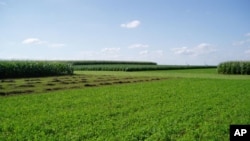After this month's U.S. elections, Republicans are poised to take control of the House of Representatives with the promise to cut federal spending. The billions spent supporting American farmers are a ripe target for some.
Critics say the subsidies not only cost taxpayers money, they also hurt farmers in other countries by pushing down commodity prices.
But how or whether Congress will cut farm subsidies is very much in question.
Developing-world farmers have long complained that American farmers have an unfair advantage in world trade because of generous subsidies from the U.S. government.
So they may have welcomed the election-night victory speech from John Boehner, the presumed Speaker of the House in the incoming Congress. He said that Republicans would "...take a new approach that hasn't been tried in Washington before by either party. It starts with cutting spending rather than increasing it."
Policy analyst David de Gennaro with the Environmental Working Group says, "The easiest place for them to start looking is farm subsides."
The most objectionable of the farm subsidies, he says, is the roughly $5 billion a year that U.S. farmers receive in so-called direct payments. They get that money whether they are hurting or prospering.
Although he agrees farmers need a safety net, "what we have now looks nothing like a safety net," he says. "It's pretty much a guaranteed income."
And with crop prices running high this year, many would argue that farmers don't really need the guaranteed income.
Meanwhile, the United States is $13 trillion in debt. That's why even the nation's largest farm groups expect those direct payments to come under greater scrutiny.
National Farmers Union President Roger Johnson says, "It is very hard to justify making these payments during good years. That's why we would argue that you should have programs to help when times are tough for those farmers and spend these scarce resources just where they are really needed."
Johnson says it makes more sense to help farmers in bad years -- for example, when prices are low.
But depending on what form that help takes, the World Trade Organization may disagree.
"Reducing the direct payments and redirecting the money to other kinds of farm support could actually be detrimental to the world trading system and detrimental to the interests of farmers in other countries," says David Orden with the International Food Policy Research Institute, "because they are more trade-distorting."
Orden says the WTO doesn't object to direct payments as much because that program doesn't single out any particular crop.
By contrast, the U.S. government pays cotton farmers, for example, when world cotton prices drop below a certain level. That means American farmers are more likely to keep growing cotton - keeping supplies high and world prices low. That's not fair to farmers in other countries, says the WTO. The U.S. recently lost a trade dispute on this matter, and is paying damages to Brazil.
So, by that measure, Orden says, paying farmers all the time isn't as bad for world trade.
He admits it doesn't look good politically to be paying farmers when prices are high. But he is skeptical that the policy will change.
"The history of us cutting support for farmers in the U.S. under Democratic or Republican Congresses is not very strong," he says. "And so I don't think we can take the new Congress as an indication that there will clearly be cuts in farm spending."
He notes that in 1994, the last time Republicans swept into Congress on a platform of cutting spending, farm subsidies actually went up.














